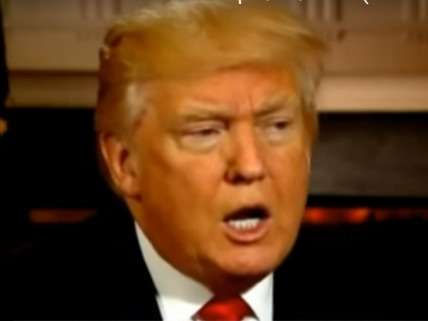Resisting Nixon Comparison, Trump Provokes Tempest Over Secret White House Tapes
Republican senators say they want the probably nonexistent recordings of the president's conversations with James Comey.

President Trump's recent tweet warning former FBI Director James Comey that their conversations may have been recorded was widely described as a "threat" or even a form of "blackmail," but that is not the way I read it. "James Comey better hope that there are no 'tapes' of our conversations before he starts leaking to the press!" Trump said. To me that sounded like Trump was suggesting Comey should not try to misrepresent what either of them said, since there might be an audio record to contradict him.
That is the explanation Trump himself offered in a Fox News interview that aired on Saturday. Trump told Jeanine Pirro he "won't talk about" whether the hypothetical recordings to which he referred actually exist. "All I want is for Comey to be honest," he said, "and I hope he will be and I'm sure he will be—I hope." In particular, Trump was annoyed by reports from unnamed associates of Comey who say the president, during a January dinner at the White House, demanded a promise of loyalty that the FBI director refused to give. Trump told Pirro that never happened, although "I don't think it would be a bad question to ask."
It might seem strange that Trump, who after firing Comey was likened over and over again to Richard Nixon (a comparison his defenders deem absurd), would invite continued criticism in that vein by talking about surreptitiously recorded White House tapes. And if I had to say which of the two participants in these conversations would be more likely to lie about them, it surely would not be Comey. But from Trump's perspective, the tweet makes perfect sense, since it creates the appearance that he is confident he did not say anything embarrassing and might make Comey think twice about "leaking to the press."
Meanwhile, two Republican senators say the recordings, if they exist, should be turned over to Congress. On NBC's Meet the Press yesterday, Sen. Lindsey Graham (R-S.C.) said the dinner conversation between Trump and Comey might shed light on the president's motivation for firing him—in particular, whether Trump was trying to impede the FBI's investigation of Russian interference in the presidential election, including the Trump campaign's possible involvement.
"Did the president ever say anything to the director of the FBI that would be construed as trying to impede the investigation?" Graham asked. "I think it's time to call the [former] FBI director before the country and [have him] explain what happened at that dinner and, if there are any tapes, they have to be turned over. You can't be cute about tapes. If there are any tapes of this conversation, they need to be turned over. I doubt if there are. But we need to clear the air."
Sen. Mike Lee (R-Utah) agrees. "If, in fact, there are such recordings," Lee said on Fox News Sunday yesterday. "I think those recordings will be subpoenaed, and I think they will probably have to turn them over." Lee alluded to Nixon and Watergate. "There have been instances in the past in which other presidents have made recordings of conversations that have taken place at the White House," he noted. "It doesn't always turn out well. It's not necessarily the best idea."


Show Comments (29)